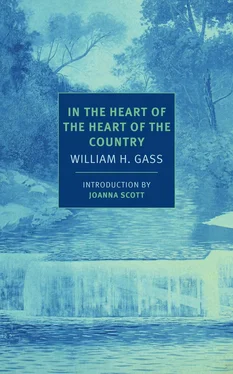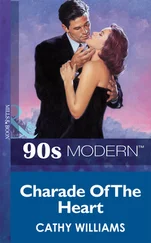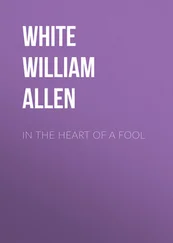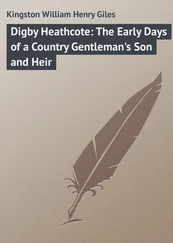Terrific. Years ago. When he seemed a prophet, sometimes a god. At the tip, he’d exclaim, raising his ink-stained fingers. A thrill would shoot through Fender, and he’d repeat the words to himself, considering again the wisdom of his teacher. Everything is property. Pearson’s face would glow, his hair shake. Everything is property. Think of it. Some sort of property. Then he’d rush through the office naming objects, lifting them up. This, and this, and this… This ear, he says triumphantly, fingering the lobe, this ear belongs to Isabelle….
Buy at the bottom. Fill your freezer. Fortunate… to take advantage of the time…
People pass on. In the midst of life, you know, Fender… well… but property, property endures. Sure, sure, cars go to junk before the people in them do sometimes, but there’s all sorts of property, that’s all, and a house will outlast its builder usually. Lots of things outlast us, Fender. Lots of things. Lots do. Hah hah. Well. That’s it. Land’s damn near immortal. Land lasts forever. That’s why it’s called real, see? oh it makes sense, Fender, old fellow and friend, it makes sense!
A rhythm in the market… up and down… your fortune… if…
People are property. Does that seem like a hard saying, people are property? not even real? Oh let me tell you, Fender, we’ve got it all wrong, most of us… backwards… most of us. People own property — that’s what we say — that’s what we think. Oh sure. Sure. A howler — that one. Listen: property owns people . Everything’s property, and the property that lasts longest — it owns what lasts least. Stands to reason. Fender, Fender, wait’ll you die, you’ll see! So the property that lives, Fender, that lasts and lives and goes right on, Fender, and then goes on again, that overlives us, Fender, that overlives … well, that’s the property that’s real, and it — it owns the rest —lock, stock, and barrel— right? Makes sense.
Fundless Fender, freezerless Fender…
It made sense, yes. It still made sense. But now it did seem a hard saying… hard to bear. His little house possessed him, it was true. He’d been cut to fit its walls. He saw what it permitted. He did not reach beyond the rooms. Up the steps of a glowering, blind-eyed house, how many times had he led them, like pets in search of owners? Pearson was right. The question his buyers should have asked — do I want to belong to this house? — they never asked. What will these floors and corners, these views, these halls and closets, do with my life? Pearson was right. Prop-purr-tee, he’d cry, a lovely sound. And Fender was bothered; he was worried. His car owned him and his shirts and shoes owned him, his socks and ties, even his towels and toothbrush were tyrannical. He moved uneasily in his clothes, staring at his suit. Imagine — there were faint stripes in the trousers he’d never noticed before. They gave him a fright, lurking in the cloth. What else might be? Body too — Pearson would lean over the desk and whisper — your body owns you… another house, isn’t it? Up front steps — how many times? He’d scrape the key in the lock and wave them in, the fools, he’d wave them in. Run , he ought to scream, and ring an alarm.
Pearson has entered, beaming, flourishing a magazine. An emperor in here, he says, twisting the magazine into a roll and aiming it at Fender, an emperor — and a man doesn’t get to be an emperor by sitting on his ass — excuse me, Isabelle — but just the same, his ass! anyway — this emperor says the secret is, ah, to live in harmony with nature . That’s what I mean, Fender. That’s what I’ve been telling you all these years. Here it is. Whack. With the flow, Fender, with the flow. Times change — you change. Business, money, people — if they move, Fender, you move. Ride with the punch. Absorb the blow. See? It’s so clear. It’s so easy. It’s so clean. An emperor. Whack. Imagine. Whack. Lived way back there, you know. It’s true. Anyway — a great magazine, Fender. Great. Whack. They weren’t so dumb in those days, were they? Read it. Clear as a bell. Whack. Slick as a whistle. Whack. Neat as a pin, hay? Clean. Whack. And remember what you read. Okay? Whackwhackwhackwhackwhack…
The cow stood squarely in a clump of daisies. At least it was some white-petaled flower with an orange or yellow eye. Smiling. He’d cut his finger on a blade of paper. Now he felt it stinging pleasantly, and his shoulders were aching. Then there the peas were finally, huddled together.
Glick, why do you do that? I mean, what are you tearing up all that paper for? Glick carefully folds a sheet and sharpens the crease with his thumbnail. This paper’s a piece of property. He smiles indulgently. You’ve got to have imagination, Fender. I’m subdividing. Numbering lots, figuring sizes, you know, drainage, easements, everything. He pulls at the corners. The land parts cleanly….
Peas. In one pie there might be anywhere from nine to eighteen peas. Eighteen was quite a few. He’d counted peas but never bits of beef or carrot. Now he wondered why. Peas cried out to be counted, they were so green and discrete, nevertheless it was the beef that determined the quality of the product. Automatically he began phrasing the letter. As you are perfectly aware, it is the meat that chiefly determines … Pig in a poke, that’s what. He chewed cautiously. Doubtless it never occurred to you that someone would actually trouble to number … The world out the window shifted. Houselights streaked the snow. Like the urine of dogs by trees. Though it didn’t seem corrosive but lay lightly on top like something transparent — a diaphanous robe. However it happens that I have been counting the pieces of beef in your pies for some —how long should he say? what would make for the greatest effect? everything took such time — well say for some years, that would put the fear of the public properly back in them. Therefore my data is quite complete and my conclusions well nigh indisputable … yes… well nigh, that was nice….
Fender was weary — weary of winter. The little energy he had was ebbing. The cloth of his suit was scraping his knees. The scraping seemed dangerous, his skin felt so thin. Miserable business. Drops of water were wavering at the points of the icicles and he decided there must be a breeze. Then too, the hull of a pea had fastened itself to a molar. He crushed his tongue against it. There ought to be a guarantee but he’d never examined the package. Had he thrown the wrapper away? It was no use, his interest was waning, though he tried to revive it by thinking of the consternation his letter might cause if it reached the right people. Threat of exposure — the Food and Drug Administration, the Federal Trade Commission. Just for a moment he was pleased and the fluid of the pie seemed thick and rich, but his pleasure was quickly gone and he felt himself empty like one of his houses, staring out at the wind and snow, at the undulating lanes of light and shadow, waiting for someone… anyone… to enter. There would be patches of ice in the streets in the morning, and then the city’s trucks would spread sand and salt about so that by afternoon each automobile would be spraying slush in its wake, and this would collect and freeze in rough gray blocks behind the wheels until, incontinent, the machine let them fall into the street.
Halting in front of Glick, Pearson says somberly: do you know what’s the matter with you, Glick? do you? have you any idea? any real notion, the least comprehension of it? Pearson waits for Glick to surface his troubled, obsequious face. Pearson’s autumnal joke is coming. It is always painful. You spend too much time raking leaflets, he says, passing swiftly through the door to his office where after a moment — always the same — they hear him whoop and roar, then roar again. Fender stares into the mess in his drawer, aimlessly shifting sheets of paper and turning over clips and pins and rubberbands. He scarcely thinks that once all this was in radiant order, each thing bespeaking its place through its nature. Another advantage of living alone — you couldn’t very well say: excuse me, don’t interrupt, I’m counting the peas in this pie; or: I’m composing a letter to those pot pie people; or — No, he was finished for the evening; he was bored by his own voice; yawns stretched his jaws and filled his eyes with tears. The phone calls would have to wait. The snowlight, though soft now, had made his eyes burn, he decided, and he put down his fork to press them tenderly and wipe the moisture from their corners. He resolved, though weakly, to draw the drapes, but as he shifted in his chair the long row of icicles blazed and his breath went out of him. For an instant Fender sat quite still, as someone wounded may who does not know what pain he’ll bring himself or blood he’ll spill, but his eyes were drawn into the string and held while the light from the living room lay burning in them. The purity of the ice was astonishing, the tips were like needles, and they ran together at their source like fingers into palms. Snow was no longer melting and the icicles had a hard dry gleam. He set aside his tray and stood. Fish in a bowl — he felt that conspicuous. He was conscious, too, of the soft warmth of the room. It was shining out to them, but the light that entered was slowly cooled and added to the ice. He tugged at the pull and dragged the curtains across the pane. No sense everyone seeing in. Better to live like a mole out of eyeshot. He’d look at a magazine, he decided, and go to bed early. Indeed he was tired. Always, even as a child, he’d needed his sleep.
Читать дальше












